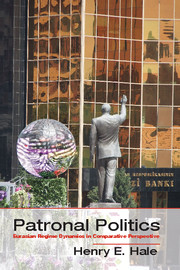Book contents
- Frontmatter
- Contents
- List of Figures
- List of Tables
- Acknowledgments
- Note on Transliteration
- 1 Introduction
- 2 Patronal Politics and the Great Power of Expectations
- 3 Eurasian History as Patronal Politics
- 4 Constitutions, Elections, and Regime Dynamics
- 5 The Emergence of Networks and Constitutions
- 6 The Building of Eurasia’s Great Power Pyramids
- 7 Revolutions and Other Presidential Ousters
- 8 Nonrevolution in Post-Soviet Presidential Systems
- 9 After Revolution
- 10 Patronal Parliamentarism
- 11 Explaining Post-Soviet Regime Dynamics
- 12 Patronal Politics in Global Comparative Perspective
- References
- Index
- References
11 - Explaining Post-Soviet Regime Dynamics
Published online by Cambridge University Press: 05 November 2014
- Frontmatter
- Contents
- List of Figures
- List of Tables
- Acknowledgments
- Note on Transliteration
- 1 Introduction
- 2 Patronal Politics and the Great Power of Expectations
- 3 Eurasian History as Patronal Politics
- 4 Constitutions, Elections, and Regime Dynamics
- 5 The Emergence of Networks and Constitutions
- 6 The Building of Eurasia’s Great Power Pyramids
- 7 Revolutions and Other Presidential Ousters
- 8 Nonrevolution in Post-Soviet Presidential Systems
- 9 After Revolution
- 10 Patronal Parliamentarism
- 11 Explaining Post-Soviet Regime Dynamics
- 12 Patronal Politics in Global Comparative Perspective
- References
- Index
- References
Summary
Now that the discussion of the details of every highly patronalistic post-Soviet polity is complete, it is appropriate to step back and consider the cumulative findings in light of other factors that have frequently been invoked by observers to explain regime dynamics in Eurasia. This penultimate chapter thus takes on several important tasks. It begins by identifying some of the main lessons learned in this volume’s analysis, starting with the need to think differently about formal institutions, less about “regime change,” and more in terms of extended patronalistic networks and regime dynamics that primarily consist of patterns over time in how these networks come to be arranged and rearranged, constituted and reconstituted. Formal institutions like constitutions and elections matter, but in different ways that are not always obvious from a Western perspective. Often they produce cyclic patterns of politics that a focus on “transition” or “regime change” can misdiagnose. After summing up these conclusions and the evidence for them, the chapter seeks to identify clearly what this book is not about, including explaining important variation in types of single-pyramid and competing-pyramid systems as well as in the particular characteristics of the networks that they comprise. Such questions constitute a fecund agenda for future research. The chapter also directly addresses factors that astute readers are sure to notice are deemphasized as explanations of regime dynamics, factors that feature prominently in many other accounts, such as international actors, transnational diffusion processes, leadership characteristics, patterns of private ownership, the spread of social media, and even state strength and weakness.
- Type
- Chapter
- Information
- Patronal PoliticsEurasian Regime Dynamics in Comparative Perspective, pp. 422 - 454Publisher: Cambridge University PressPrint publication year: 2014



